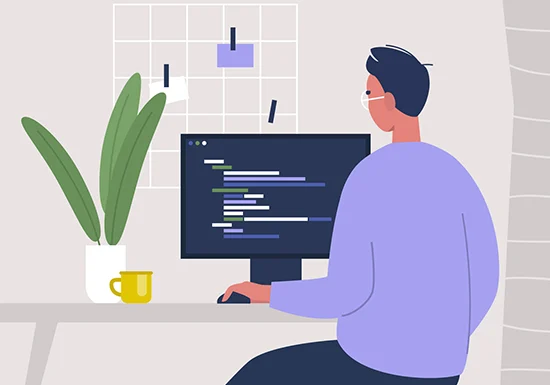Why Coding is an Essential Life Skill
Published: July 4, 2024

In today’s rapidly evolving digital world, 92% of jobs require computer skills, according to a recent report from the National Skills Coalition (NSC). Significantly, the report highlights that one-third of workers don’t have the digital skills necessary to occupy those jobs.
Many universities and corporations have introduced computer proficiency programs to combat this skill gap, allowing workers to learn fundamental computer skills. Most entry-level jobs today require competence in operating systems, desktop environments, internet browsers, word processing, spreadsheets, and communication platforms like Zoom, Microsoft Teams, and Slack. Individuals possessing at least one of these computer skills can earn a 23% salary increase, while those proficient in three or more computer skills can see their earnings rise by 45%, according to the same NSC study.
Coding is emerging as the next critical computer skill in demand by employers. A survey by NTUC LearningHub found that 84% of companies reported they need people who code in at least some of their positions, while 28% said most of their company’s jobs required coding knowledge. These positions span various industries, from healthcare to finance to education.
No longer just the purview of computer scientists, coding is a versatile skill that can enhance problem-solving abilities, foster creativity, and open up a wide array of career opportunities. Workers looking to advance their skills should master languages like Python, JavaScript, and Java, all widely used in software development, web development, and data analysis.
Differentiating between coding and programming here may be instructive. While often used interchangeably, coding and programming are distinct activities in software development. Coding is the act of writing instructions in a language that a computer can understand, while programming is a more technical process learned as part of computer science degree programs. It encompasses writing code as well as planning and structuring a program that tells a computer how to behave.
Non-technical coding roles generally involve writing scripts for data analysis, automating repetitive tasks, or developing basic tools to solve specific problems within the workplace. This level of coding does not require deep technical expertise but focuses on applying practical solutions to everyday challenges.
Workers who can code can significantly enhance productivity and communication within their companies. Their understanding of technical jargon allows for clearer communication between technical and non-technical team members, reducing misunderstandings and streamlining workflows. Furthermore, being able to generate reports and analyze data through written code enables teams to tackle tasks more efficiently and make informed decisions.
Aside from gains in both productivity and career advancement, learning to code is a valuable life skill that cultivates problem-solving skills, creativity, and digital literacy. Coding teaches individuals to break complex problems into manageable steps, fostering a logical approach to solving issues. This systematic thinking is beneficial not only in technology-related fields but also in everyday life, where problem-solving is key to overcoming challenges.
Moreover, it promotes creativity and innovation by empowering individuals to transform their unique ideas into tangible products. Coding is the key to creating software, websites, and applications that address market needs, streamline operations, and enhance user experiences.
Coding also fosters digital literacy, equipping individuals with the necessary skills to thrive in the modern digital landscape. By understanding how digital technologies operate and interact, individuals can adapt to new digital platforms, including artificial intelligence (AI), which has become increasingly popular over the past two years.
Coding skills are essential for creating algorithms, developing machine learning models, and ensuring ethical AI deployment. As AI continues to evolve, individuals with coding knowledge will be better able to innovate with this and other future technologies, like quantum computing, blockchain technology, edge computing, and augmented reality/virtual reality (AR/VR).
Although basic coding skills can be acquired from a variety of websites, individuals who truly want to upskill in this area may benefit from a degree in computer science. In such a program, students become fluent in programming languages like Java and Python and proficient in database management.
UoPeople’s computer science curriculum is designed to meet the demands of the modern tech industry, providing students with the ability to manage projects from conception to implementation and debug and test new programming solutions. This degree is particularly beneficial for working professionals aiming to advance their technical skills or pursue an advanced computer science degree.
Moreover, the UoPeople program incorporates emerging technologies such as artificial intelligence (AI), machine learning, data mining, and AR/VR, preparing students for the future of technology.
As a means of bringing ideas to life, coding will remain a crucial skill as we enter an era dominated by artificial intelligence and automation. By understanding how technology works, individuals can leverage these insights into new solutions.
Coding not only prepares people for the evolving job market but also equips them with the tools to be active contributors in shaping their futures. With sharpened skills in critical thinking, problem-solving, and creativity, coders will be at the forefront of innovation and social change.
